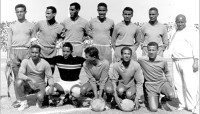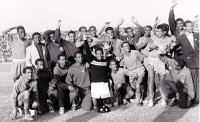By Fekrou Kidane
 The 1962 Ethiopian National Team (Photo: Bezabeh Abetew)
The 1962 Ethiopian National Team (Photo: Bezabeh Abetew)
The origins of the African Nations Cup date back to June 1956 when the creation of the Confederation of African Football was proposed during the third FIFA congress in Lisbon. There were immediate plans for a continental nation’s tournament to be held, and in February 1957, the first African Cup of Nations took place in Khartoum, Sudan. There was no qualification for this tournament, the field being made up of the four founding nations of CAF (Sudan, Egypt, Ethiopia, and South Africa). South Africa’s insistence on selecting only Caucasian players for their squad due to that nation’s apartheid policy led to its disqualification, and as a consequence Ethiopia were handed a bye straight to the final. The Ethiopian delegation headed by the late Yidnekachew Tessema who served as CAF President before Issa Hayatu, played crucial role to suspend South Africa from the tournament for its Apartheid Policy.
Hence, only two matches were played, with Egypt being crowned as the first continental champion after defeating hosts Sudan in the semi-final and Ethiopia in the final. Two years later, Egypt hosted the second cup in Cairo with the participation of these same three teams. Host and defending champions Egypt repeated as cup winners, this time defeating Sudan in the final.
 Luciano will tie the game after receiving this pass from the late Getachew Wolde (Photo: Bezabeh Abetew) –
Luciano will tie the game after receiving this pass from the late Getachew Wolde (Photo: Bezabeh Abetew) –
The field grew to include nine teams for the third African Nations Cup in 1962 in Addis Ababa, and for the first time there was a qualification round to determine which four teams would play for the title. Host Ethiopia and reigning champion Egypt received automatic berths, and were joined in the final four by Uganda and Tunisia. Egypt made its third consecutive final appearance, but it was Ethiopia that emerged as victors, after first beating Tunisia and then downing Egypt in extra time.
Egypt, Sudan and Ethiopia played the first two tournaments in odd years before it increased to four, six, eight, 12 and then 16 teams. The number of participants in the final tournament reached 16 in 1998 (16 teams were to compete in 1996 but Nigeria withdrew, reducing the field to 15), and since then, the format has been unchanged, with the sixteen teams being drawn into four groups of four teams each, with the top two teams of each group advancing to a “knock-out” stage.
From the 3rd African Cup in 1962 to the 28th African Cup in 2012 the tournament had taken place in even-numbered years. As of 2013, the tournament was once again switched to being held in odd-numbered years so as not to clash with the FIFA World Cup.
 Mengistu Worku scoring Ethiopia’s 4th goal against Egypt (Photo: Bezabeh Abetew) –
Mengistu Worku scoring Ethiopia’s 4th goal against Egypt (Photo: Bezabeh Abetew) –
Since the early days, North Africa – and Ghana in particular – has maintained its reputation, while the other pioneers Ethiopia and Sudan have deteriorated.
And while there have been many highlights, few African Nations Cup tournaments have taken place without any problems.
One thing is certain, though – that CAF and the Nations Cup still in existence is due to the passion for the game on the African continent.
Egypt is the most successful nation in the cup’s history, winning the tournament a record seven times (1957, 1959, 1986, 1998, 2006, 2008, 2010). Besides this they finished once as runners up in 1962 and won the third place three times (1963, 1970, 1974). But this glorious history of Egypt couldn’t help them get a place in the final in the 2013 and 2015 finals. It may be seen that these are dark ages of Egyptian football who dominated the African Cup for years.
 Victorious Ethiopian Team (Photo: Bezabeh Abetew) –
Victorious Ethiopian Team (Photo: Bezabeh Abetew) –
Hosts
The first host nation of the African Cup is Sudan. It hosted two times. Egypt has hosted for a record four times. Ethiopia, Ghana and Tunisia hosted each three times. South Africa hosted two times. Ghana and Nigeria, Equatorial Guinea and Gabon co-hosted the game for the first and second times, respectively, in the cup’s 58 years history. Equatorial Guinea, Angola, Mali, Burkina Faso, Senegal, Algeria, Morocco, Côte d’Ivoire, Libya, Nigeria and Cameroon each hosted once.
The 2013 tournament is the highest attended edition of the Africa Cup of Nations under the current 16-team format.
Wider goals scored in the final
So far the 4-0 win of Egypt over Ethiopia in the first African Cup final is registered as a record for wider margin win in the final. (Ethiopia avenged that defeat beating Egypt 4-2 in the third African Cup final.) Nigeria’s 3-0 win over Algeria and Ghana’s 3-0 win over Sudan are the second wider margin wins in the final.
The Trophy
 Team captain Luciano Vassalo receiving the cup from H.I.M. Haile Selassie (Photo: Bezabeh Abetew) –
Team captain Luciano Vassalo receiving the cup from H.I.M. Haile Selassie (Photo: Bezabeh Abetew) –
Throughout the history of the Nations Cup, three different trophies have been awarded to the winners of the competition. The original trophy, made of silver, was the Abdelaziz Abdallah Salem Trophy, named after the first CAF president, Egyptian Abdelaziz Abdallah Salem. As the first winner of three Nations Cup tournaments, Ghana obtained the right to permanently hold the trophy in 1978.
The second trophy was awarded from 1980 to 2000, and it was named “Trophy of African Unity” or “African Unity Cup”. It was given by the Supreme Council for Sports in Africa to the CAF prior to the 1980 tournament and it was a cylindrical piece with the Olympic rings over a map of the continent engraved on it. It sat on a squared base and had stylized triangular handles. Cameroon won the Unity Cup indefinitely after they became three-time champions in 2000.
In 2001, the third trophy was revealed, a gold-plated cup designed and made in Italy. Cameroon, permanent holders of the previous trophy, were the first nation to be awarded the new trophy after they won the 2002 edition. Egypt won the gold-plated cup indefinitely after they became three-time champions in 2010, in an unprecedented achievement by winning three consecutive continental titles.
Source: Ethiopian Herald









